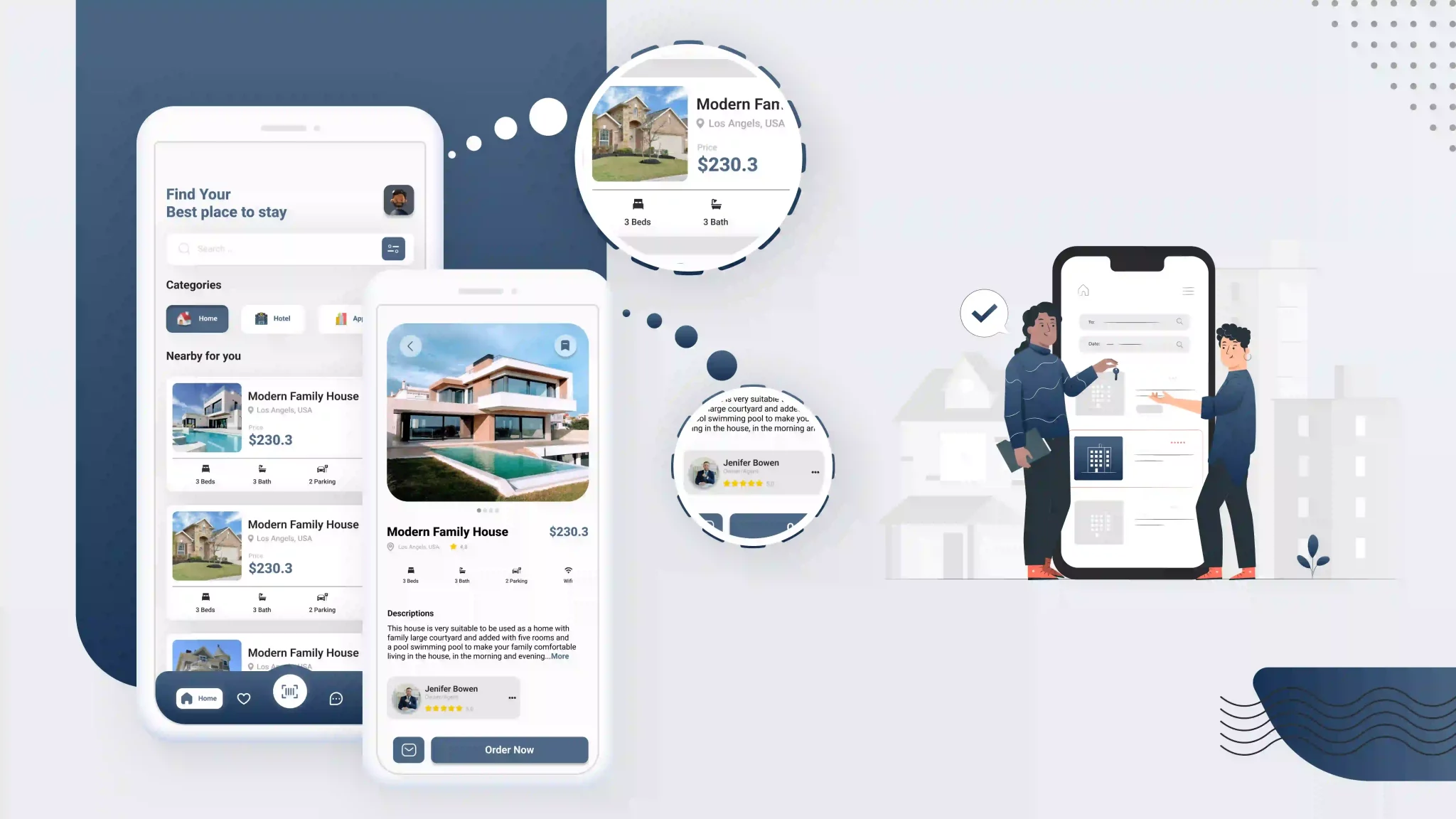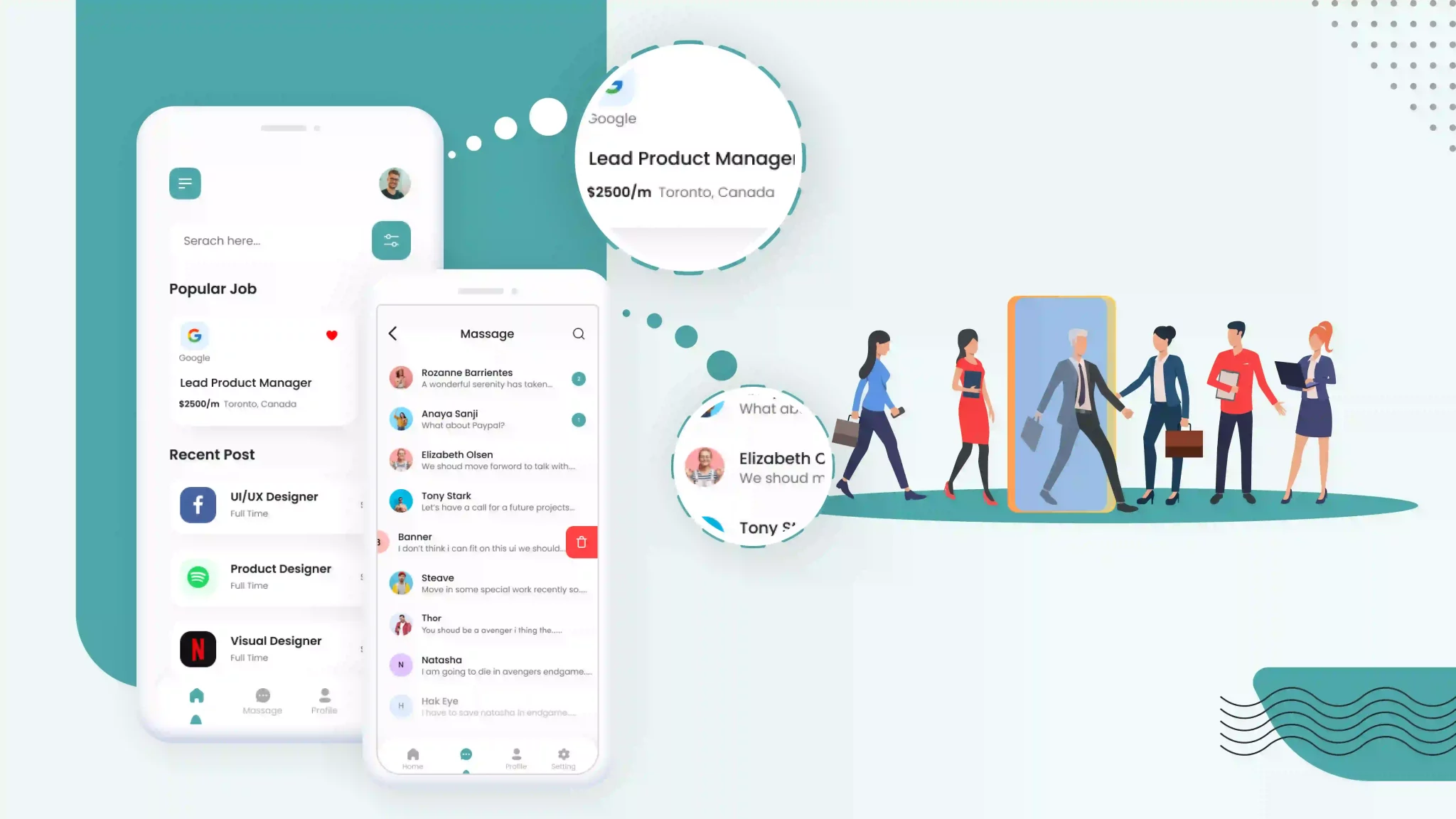Gone are the days when finding a property to reside in or starting a business took your breath away. In modern times the real estate business has found a way to survive in the market. Finding property has always been challenging. But now all you need to do is a few clicks and a few customizations, and you will be able to navigate several properties virtually.
After Covid19 took the world by storm, people have become more dependent on mobile apps for buying, selling, and renting properties. According to data, in 2022, 96% of people looking for real estate used the internet to find their destination, of which 60% used real estate mobile apps.
If you are making your way into the world of real estate, it’s time to delve deeper into how you can build an app that will help you deal with properties, owners, buyers, and renters with the help of an app.
Have a look and gain insights into real estate app development and how it can impact your business.
Features To Be Included In A Real Estate Mobile App
The tech-savvy app developers have got their grounds checked and curated apps that have proven to be revolutionary in the real estate market. You can customize the features you want to keep based on convenience.
So what are the features that will help you to be a real estate giant? Have a look!
1. Database and Listing
Listing the properties you are dealing with is essential to your app. It defines the properties in a detailed and specific manner so that the visitor can easily view the property. The simpler, the better. To maintain the listing, you must do some backstage jobs- creating a vast database.
2. Sign-up
After downloading the app, the first page the visitors will encounter is the sign-in and login page. Enabling the visitors to signup via social media, email, or contact number makes it easy for them to use the app. Some agencies opt for either of these options, while some insist on having all the information filled.
3. Categorizing and Filtration
If you have a more extensive database and listing, the visitor might get overwhelmed, facing decision fatigue. Adding features to sieve through the various categories will help them narrow the options according to their convenience.
Categorizing the properties based on buyers, or sellers, property area, pricing, number of floors, location, etc., will assist the visitor focus on the essential factor. For example, if the visitor is a buyer, they will choose the “buy property” option. Further, depending on their needs, they will set the property’s price, area and location. By adjusting these factors, they will get fewer options. Hence, it is easier to choose.
4. Personalization of the User Profile
Getting the users to create a personalized profile will help both the user and the company. When a user gives their detail and preferences and create a search history, you as a company can use this information to reach out to the user personally and offer them better suggestions based on their footprint.
Furthermore, you can distinguish if the user is a buyer, seller or someone looking for rent. The personalized profiles will help the user wishlist the potential properties, enquire about them and keep track of them.
Consider these things while making your app will eventually develop a sustainable growth process.
5. Price calculator of the property
A price calculator helps the potential seller or buyer to get an idea about the appreciation or depreciation rate of the property considering various factors like location, availability or current affairs. It becomes easier for the buyer or the seller to make a decision.
This feature might also include details like down payment, loan, rate of interest, etc. It is a dynamic phase, and as a real estate marketer, you will have to keep changing and upgrading this feature.
6. Map Viewing
Map viewing is another vital aspect that has proven beneficial for housing apps. This feature helps the customer look deeply into the location without visiting the place physically.
For instance, when a person is willing to buy a residential property, they might be looking to buy it in a place where near medical care facilities, schools, shopping markets, etc.; these are some essential facilities a family might prioritize. A map will help them determine if these amenities are available near the property they are considering investing in.
The Process of Real Estate App Development
You cannot dive into developing an app right away, and you need to study in-depth and determine what you are looking for. While you will be meeting the app developers, you cannot be vague in describing your need, which might end up in building an app that will take you away from your aim.
Any mobile app development agency follows simple steps to build an app which are as follows:
Step#1: Planning
In this step, you need to meet with app developers and professionals with experience in developing apps in the real estate niche. Once you have an idea about how the app will function and what your role will be in it, you will have it easier to develop a detailed plan.
Step#2: Designing
There are many aspects that you will need to consider, like the theme color, font, etc. Aim to make your app look minimalist and aesthetic. Adding too many designs and vibrant colors might repel visitors making them feel clumsy. A real estate app will have many numbers and details, so keeping it simple will give it an organized look.
Step#3: Development
Once you have decided on the appearance of your app, the developers will now dedicate their time to making the app. The making process includes code development and other technicalities. It is the most time-consuming process.
Step#4: Testing
Before broadly launching the app in the market, you need to choose a handful of clients and make them use it. These customers will give you valuable feedback. Some positive, some negative. You must work on the negatives and ask the app developer to amend the shortcomings.
Cost of real estate App development
The App development process cost depends on the complexity of the app. The more features you will add, the more pricey it will become. In order to give you a rough idea, app development takes from $10,000 to $75,000.
If you have planned a fixed allotment that you can spare on the app development venture, tell that clearly to the team of developers at the first meeting. These developers who have experience are habituated to working under all budgets. When they have an idea about how much you can spare, they will aim to provide the best features to help your business grow, even if your budget is tight.
Some of the factors that assist in deciding the cost of the app development app are:
- Number of developers
- Number of hours
- Complexity of the app
- Number of features
- Tools and technology usage
Retain Your Leads
Making your app richer in terms of the number of clicks it is getting and the people signing up will help your Agency grow. Make your app as appealing as possible to attract visitors. Whilecustomizing the page, don’t forget the thing that you are making this app for your clients; thus, make it user-friendly.
Conclusion
While a user is looking for a property, they might need to see the locality and study it before moving into a property in that area. Apart from this keep adding all the other basic features that are discussed in this article. These features are preliminary steps that will kick-start your app.
Developing an app for your business to go the extra mile and meet your goals is time-consuming. You will require a lot of patience and must be in touch with the developers. Brief them on the design you have in mind, test the app and decide the cost. Once you have figured it out, you can have a real estate app and forge ahead with your business.
Get in touch with Codobux to get mobile app development services and boost up your real-estate business!




